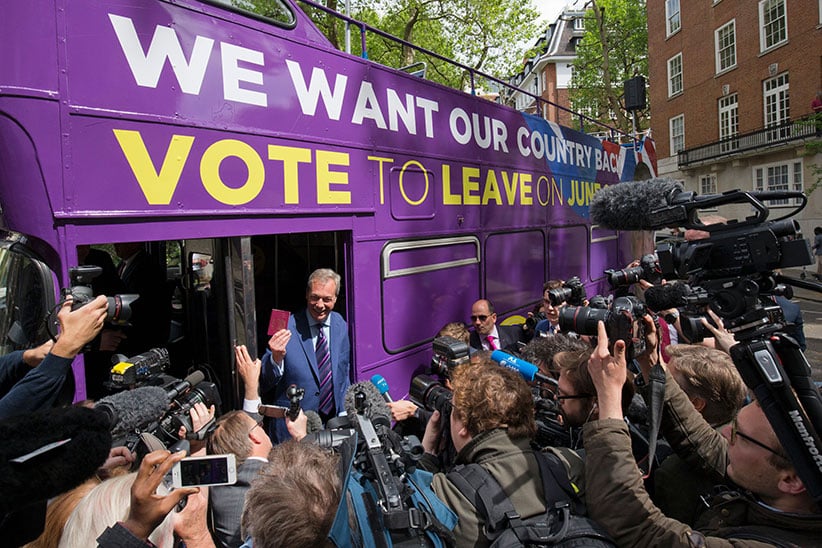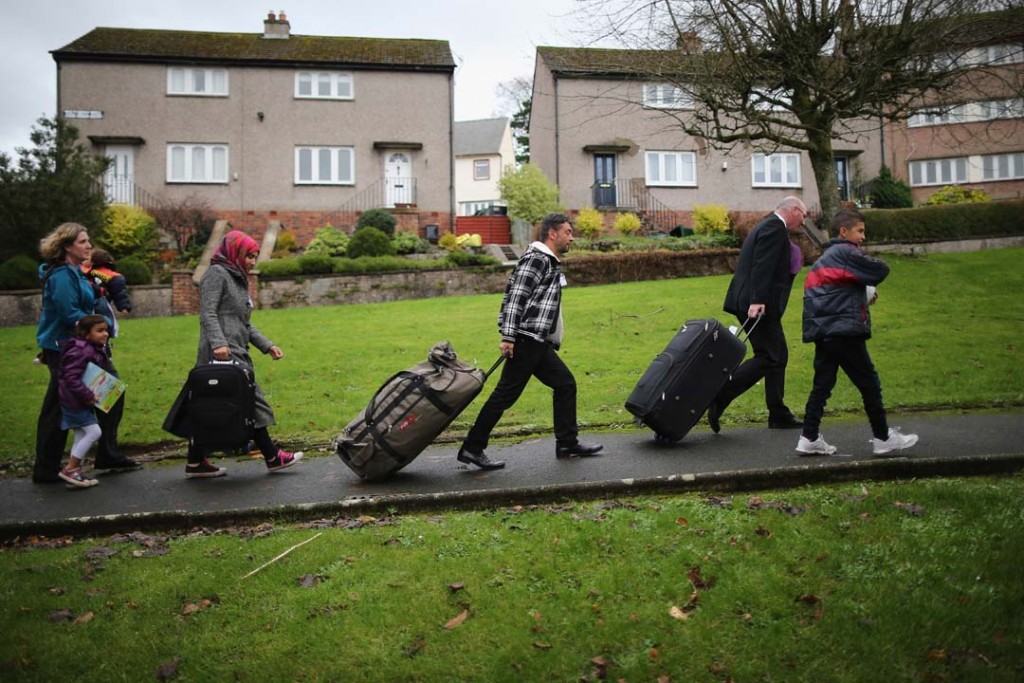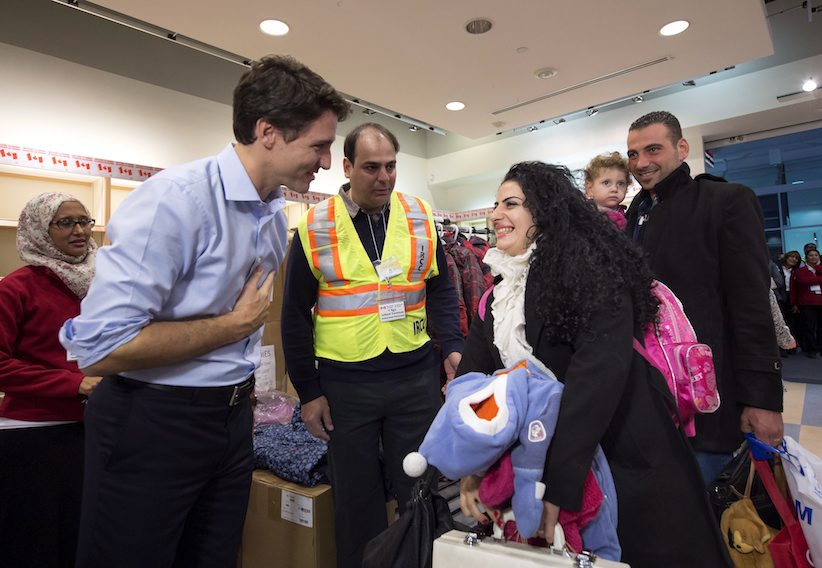The lessons Canada should learn from Britain’s anti-immigrant politics
Opinion: Canada is seen as a global beacon on immigration. But Justin Trudeau would be wise to look for the warning signs that Britain ignored before Brexit
A Vote to Leave campaigner holds a placard as Leader of the United Kingdom Independence Party (UKIP), Nigel Farage campaigns for votes to leave the European Union in the referendum on May 25, 2016 in Bolton, England. Nigel Farage took his battle bus to Bolton encouraging British people to vote to leave the EU on 23rd June 2016. (Christopher Furlong/Getty Images)
Share

Julia Rampen is a news editor for The New Statesman and a Canadian citizen based in London. She writes about politics, economics and social issues.
On Jan. 29, 2017, the newly inaugurated U.S. President Donald Trump got to work and announced a ban on travel and migration from a number of Muslim-majority countries—and in the world’s airports, chaos ensued. Passengers who boarded planes confident of their U.S. itinerary found themselves blocked on landing. Protesters and human-rights lawyers gathered outside airports. Security officials, surprised as everyone else, floundered.
Justin Trudeau, though, was quick to respond. “To those fleeing persecution, terror & war, Canadians will welcome you, regardless of your faith,” he tweeted. “Diversity is our strength #WelcomeToCanada.” To date, the tweet has been shared nearly 418,000 times.
It’s the kind of message that has helped Canada become a byword in the international community for a sensible, progressive attitude to immigration. In Britain, too—where 3.7 million European Union citizens spent 2017 waiting to hear whether they could continue to live in the country they had made their home, and where, after a rancorous Brexit vote that many saw as hinging on the issue of immigration, British Prime Minister Theresa May declared that “if you believe you’re a citizen of the world, you’re a citizen of nowhere”—the message was received.
Yet not so long ago, Britain also celebrated diversity, and a U.S. president depicted his Kenyan father and Indonesian childhood as a modern version of the American Dream. Trudeau might declare, as he did in June, that “our differences make us strong,” but there are signs that not everyone agrees—signs that we missed in Britain, until the morning of Jun. 24, 2016, when the cost of missing them became impossible to ignore.
Multiculturalism, Trudeau said in that June statement, “is at the heart of Canada’s heritage and identity.” This may be true, but when it comes to views on immigration, Canada is almost indistinguishable from a European country. A 2017 study by University of Toronto political scientist Michael Donnelly found that seven in ten Canadians would only accept “a few” or “some” poor immigrants, a view most similar to public opinion in France. Most people were willing to be generous to refugees, but only to the extent that British people were. While Canadians were generally positive about the impact of immigrants on the economy—and here, it’s worth noting Canada did not have as bad a financial crisis as many European countries—one in five would support stopping all immigration to the country.
So far, it has been possible for Canada’s political establishment to ignore this awkward squad on immigration. But this may say more about their opponents’ organizational skills than Canadian exceptionalism. “Both countries have large blocs of people who are genuinely upset about immigration alongside many who are quite comfortable with it,” Donnelly said in an interview with Maclean’s, when asked about the U.K. and Canada. “Perhaps the anti-immigrant group is a bit larger in the U.K. than in Canada, but I’d say the major difference is the lack of a British National Party, or the UK Independence Party, to attract and, to an extent, legitimize the fringe right, which is present in both countries.”
MORE: Neo-Nazis are no joke—they just want you to think they are
The British National Party—a far-right group that, at its high point in the mid-2000s, managed to elect some local councillors—is unlikely to keep Canadian liberals up at night. UKIP, however, is a different story. Under the leadership of the beer-swilling, hat-doffing Nigel Farage, the party charmed its way into TV studios and foxtrotted a fine line between respectable, if anti-European Union, political rhetoric, and far-right xenophobic dog whistles. By 2015, Farage had still not managed to get elected to the Westminster Parliament, but two Conservative MPs had defected to UKIP, immigration was a dirty word, and a rattled David Cameron, then the Conservative prime minister, promised a referendum on EU membership.

Defenders of Britain’s anti-immigration turn will point out that there is one stark difference to Canada: the free movement rules which allowed up to 190,000 EU citizens a year to come to the U.K. and indeed, admiration for Canada’s immigration system is shared by some British Eurosceptics, who say they are in favour of control rather than ending immigration per se. Still, immigration was an issue that united voters across party lines, and against their own party leadership. The Lincolnshire town of Boston—christened Britain’s “most Brexit town” because of the high Eurosceptic vote—experienced a 460-per-cent rise in immigration between 2004 and 2014.
British liberals who reject anti-immigration sentiment, yet accept that after Brexit it has to be taken seriously, often argue that this is because immigration has become a proxy for economic concerns. It is true that in the years between the financial crisis and Brexit, Britain’s Conservative-led government inflicted a series of cuts on public services. Between 2007 and 2015, the U.K. was the only advanced country to see wages shrink while the overall economy grew. For older residents of post-industrial provincial towns, far from the cosmopolitan splendours of London, it would not take a great leap of imagination to believe that there were too many people in the country willing to work for too little. Although at first glance Canada is not plagued with these problems, liberals might want to take note of the fact that in 2014, the country was ranked third worst for regional economic disparity among countries in the OECD.
Yet there is another bulwark against anti-immigration sentiment in Canada, and this one is far easier to overcome. While the majority of British MPs were in favour of remaining in the EU, the two biggest-selling newspapers in the U.K., The Sun and The Daily Mail, backed Leave. This was no surprise, not least given the same papers had already successfully been blurring the lines between immigrants, refugees and criminals for years. In the spring of 2015, after roughly 1,600 people had died trying to cross the Mediterranean in at the beginning of what would later be called “Europe’s refugee crisis,” Sun columnist Katie Hopkins wrote a piece entitled “Rescue boats? I’d use gunships to stop migrants.” The Daily Mail published a front page declaring: “MIGRANTS: HOW MANY MORE CAN WE TAKE?”
Hopkins, who also compared refugees to cockroaches, ultimately proved too much for mainstream British audiences after she called for a “final solution” in the wake of a domestic terror attack. But she quickly found a new job—with the Canadian-based Rebel Media, where she hosts her own website, Hopkins World. (Her discussion of “shithole countries” has already prompted one Canadian reader to lament the “Clown Prince” of the liberals, “Justin Mohammed Trudeau.”)
According to Ryan Scrivens, an academic at Concordia University who has spent six years studying far-right extremism, some Canadians are receptive to a “traditional” racist skinhead message. More common, though, is the trend of being drawn to the alt-right, which inhabits the same, ambiguous area as UKIP and columnists like Hopkins. “The alt-right is watered-down hate,” said Scrivens. “It’s the more mainstream, palatable, and acceptable form of hatred, which seems to resonate with more people.”
While Scrivens echoes Donnelly’s view that the far right struggles to co-operate in Canada, he does identify one issue they can unite behind: immigration. Here, the concerns resemble those in Europe, with the focus on refugees from Muslim countries. “With that comes a (mis)perception that, with an increase in Muslim immigrants, Sharia law will be imposed on Canadians and terrorists will sneak into the country and cause harm.”

One year on from his tweet, Trudeau does not face an obvious ideological opponent on immigration, at least so long as Andrew Scheer, focussed on a message of inclusion, leads the Conservatives; Kellie Leitch, who brought anti-immigration ideas to the Tories’ leadership campaign, now faces a nomination challenge for her seat from within her own party in 2019. But the lesson from Europe and the U.S. is that anti-immigration movements do not come from within the establishment. Sites like Rebel Media have seized on the implications of Trudeau’s “Welcome to Canada” message, calling the movement of people from U.S. to Canada since Trump took power a “border invasion.” Leitch and movements like Canada First continue to depict welcoming refugees and Canadian values as incompatible, and despite her loss, a poll during the Conservative leadership campaign found that a majority of Canadians supported some form of values test.
With his personal popularity ratings slipping, and the influence of online media growing, Trudeau needs to beware an insurrection from below. Otherwise, he may be surprised about how quickly a country’s reputation can change.
MORE ABOUT IMMIGRATION:
- Memo to Donald Trump: Canadian immigrants from ‘shithole’ countries are thriving
- Canada’s failing refugee system is leaving thousands in limbo
- A Yazidi family’s traumatic first days in Canada
- How Canada could prepare for potential new wave of asylum seekers
- Visible minorities may comprise one-third of Canadians by 2036
- Chelsea Manning denied entry into Canada
- How Canada can restore order to its immigration system
- Justin Trudeau is between a rock and a heart place on immigration